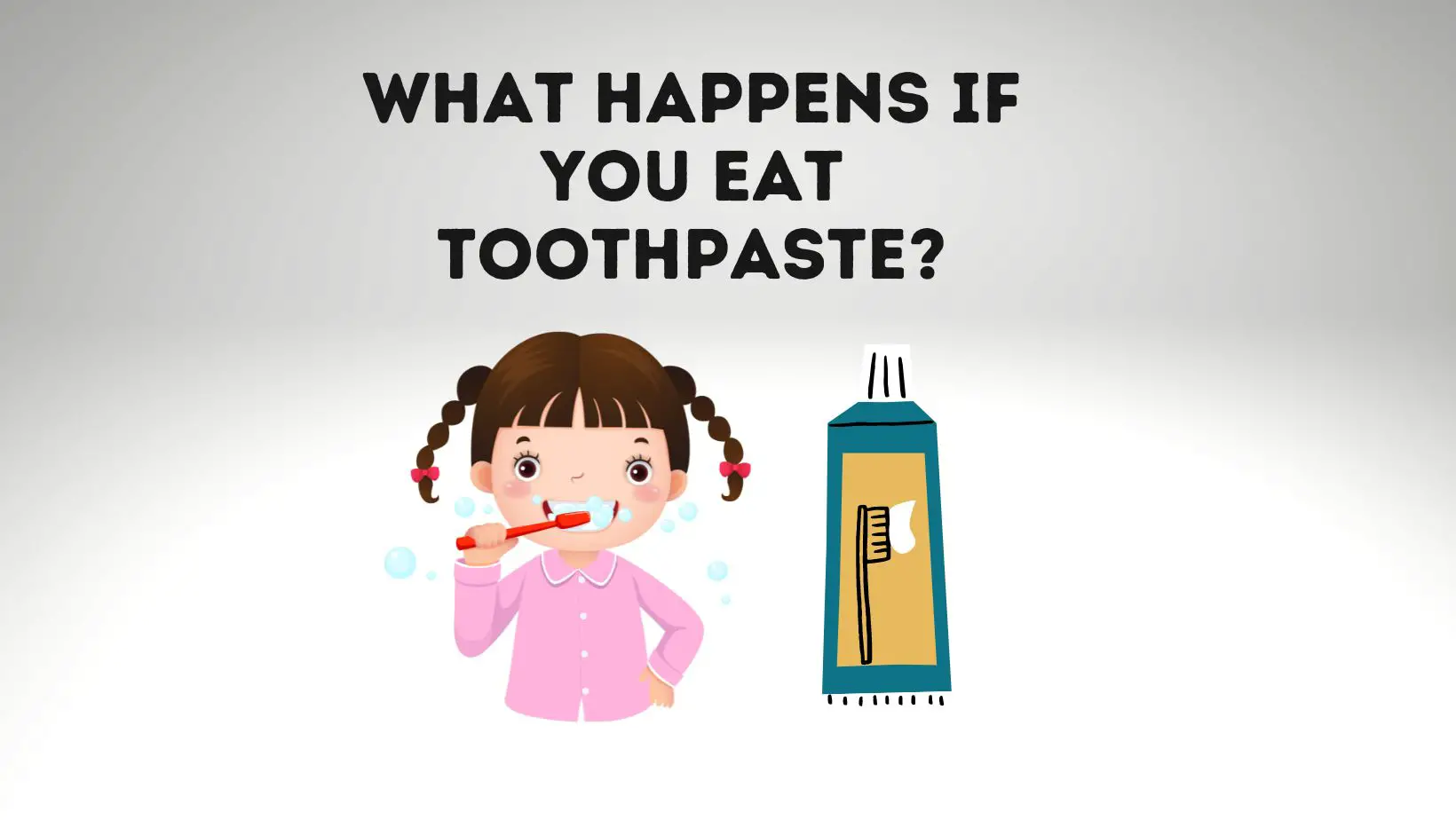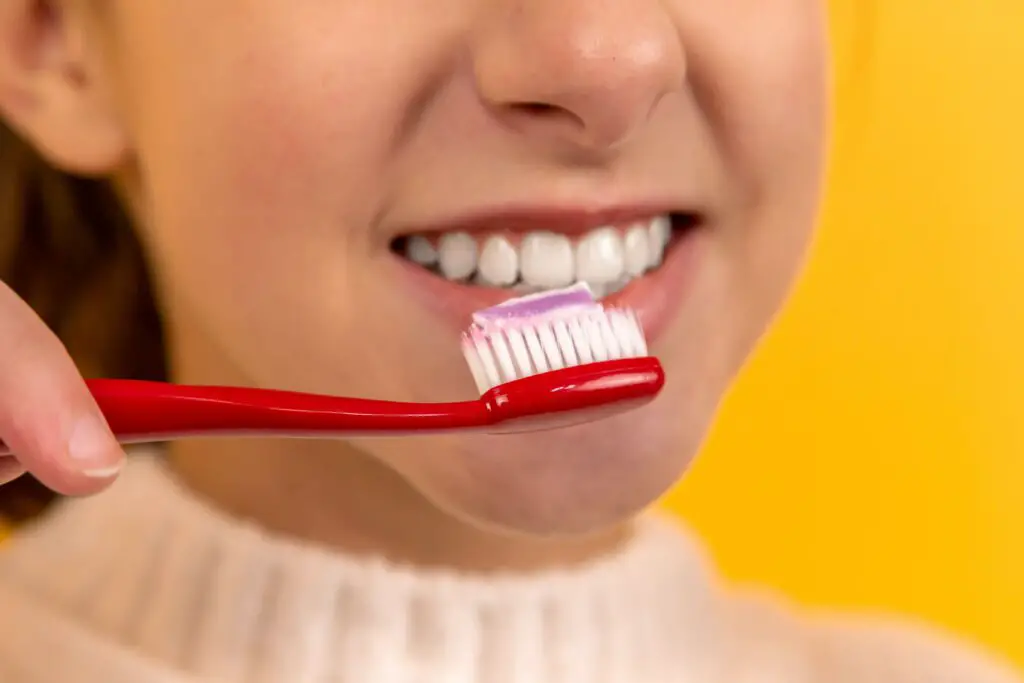
You may have heard that eating toothpaste can be bad for you, but why is this? What exactly happens if you eat toothpaste? In this blog post, we’ll take a look at the risks of eating toothpaste and explore what can happen if you do. We’ll also cover the different types of toothpaste available and how to keep your mouth healthy without the risks associated with consuming it. So if you’re curious about what happens if you eat toothpaste, read on to find out more!
The Ingredients in Toothpaste
Toothpaste is made up of a variety of different ingredients, all of which serve a specific purpose. The most common ingredients in toothpaste are: fluoride, to help prevent cavities; abrasives, to help remove plaque and stains; and detergents, to create a foamy texture. Other ingredients may include: bleaching agents, flavorings, sweeteners, and preservatives.
Fluoride is the ingredient that is most beneficial for your teeth. It helps to prevent cavities by making your teeth more resistant to acid attacks. Abrasives such as baking soda or calcium carbonate help to remove plaque and stains from your teeth. Detergents create a foamy texture that helps to keep your mouth clean.
Bleaching agents such as hydrogen peroxide can help to whiten your teeth. Flavorings add taste and smell to the toothpaste, while sweeteners make it more palatable. Preservatives help to extend the shelf life of the toothpaste.
The Dangers of Ingesting Toothpaste
If you’ve ever eaten toothpaste, you may have noticed a minty taste and an unpleasant tingling sensation. While these side effects are usually harmless, there are some risks associated with eating toothpaste.
Toothpaste is designed to clean your teeth, so it’s no surprise that it can be harsh on your digestive system.
Ingesting large amounts of toothpaste can cause stomach pain, nausea, vomiting, and diarrhea.
Toothpaste also contains fluoride, which is a mineral that helps prevent cavities. However, ingesting too much fluoride can lead to fluorosis, a condition that causes yellowing and mottling of the teeth.
In extreme cases, toothpaste ingestion can even be fatal. Ingesting large amounts of toothpaste can cause a blockage in the intestine, which can lead to intestinal obstruction and death.
In rare cases, eating toothpaste can also lead to choking or suffocation. This is more likely to happen if the toothpaste is swallowed without enough water. If you or someone you know starts choking after eating toothpaste, call 911 immediately.
So, what happens if you eat toothpaste? Short-term side effects like stomach pain and nausea are common, but most people recover quickly without any lasting damage. However, there are some risks associated with ingesting toothpaste, so it’s best to avoid it altogether!

What to Do If You Eat Toothpaste
If you accidentally eat toothpaste, there’s no need to panic. Simply drink a glass of water and rinse your mouth out thoroughly. If you’re concerned about the amount of fluoride you may have ingested, contact your dentist or doctor. In most cases, eating a small amount of toothpaste is not harmful and will not cause any adverse effects.
How to Prevent Eating Toothpaste Habit?
Toothpaste is not meant to be eaten, and can be harmful if consumed in large quantities. Some of the ingredients in toothpaste, such as fluoride, can be toxic if ingested in large amounts. swallowing small amounts of toothpaste is not likely to cause any harm, but it is best to avoid eating it altogether. Here are some tips on how to prevent eating toothpaste:
-Keep toothpaste out of reach of children and pets.
-Do not share your toothbrush with anyone else.
-Do not use a toothpaste that contains fluoride if you are pregnant or breastfeeding.
-If you accidentally eat toothpaste, drink a glass of water and rinse your mouth out thoroughly. If you’re concerned about the amount of fluoride you may have ingested.
-Be aware of the signs and symptoms of fluoride toxicity, which include gastrointestinal distress, vomiting, and diarrhea.
If you or someone you know ingests a large quantity of toothpaste, call Doctor immediately.
Is it OK to eat a bit of toothpaste?
There’s no need to worry if you accidentally swallow a little toothpaste while brushing your teeth. However, swallowing a lot of toothpaste can be harmful.
Toothpaste is meant to be spit out after brushing, not swallowed. Swallowing toothpaste can cause stomach upset and diarrhea. In severe cases, it can lead to an electrolyte imbalance or constipation.
If you’re concerned about swallowing too much toothpaste, talk to your dentist or doctor. They can help you find a toothpaste that’s safe for you to use.
Why My Child Wants To Eat Toothpaste?
If your child wants to eat toothpaste, don’t panic. While eating toothpaste is not ideal, it is not necessarily harmful. The main thing to be concerned about is if your child swallows a large amount of toothpaste. If this happens, call your doctor or poison control immediately.
If your child just wants to try a little toothpaste on their own, be sure to keep it out of reach of children and pets. Toothpaste is not meant to be eaten and can be harmful if ingested in large quantities.
Don’t the the toothpaste eating turn into a habit over time? While, There is no evidence to support the claim that toothpaste eating becomes a habit over time. If your child does eat toothpaste, you may want to brush their teeth afterwards to remove any residue. You should also monitor them for any signs of gastrointestinal distress, such as nausea or vomiting. If they experience any of these symptoms, call your doctor or poison control immediately.
My Child Ate Toothpaste? What to Do Now?
If you child ate toothpaste, the first thing you should do is call your child’s dentist. If your child is experiencing any symptoms, such as upset stomach, diarrhea, or vomiting, you should also call your doctor or take them to the emergency room.
When you call the dentist, they will likely ask you how much toothpaste your child ate and what kind it was. They may also ask about any symptoms your child is experiencing. Based on this information, the dentist will determine whether or not your child needs to be seen urgently.
If your child does not have any symptoms and only ate a small amount of toothpaste, the dentist may recommend that you watch them closely for 24 hours and call back if they develop any symptoms. If they ate a larger amount of toothpaste or are experiencing any symptoms, the dentist will likely recommend that you bring them in for an examination right away.
At the appointment, the dentist will assess your child’s oral health and decide if any treatment is necessary. In most cases, no treatment is needed and your child will simply need to brush their teeth more thoroughly to remove all of the toothpaste from their mouth. However, in some cases where a large amount of toothpaste was eaten or there are other complications, additional treatment may be necessary.
What Happens If You Eat a Tube of Toothpaste?
If you eat a tube of toothpaste, you will most likely experience an upset stomach. This is because toothpaste is designed to clean your teeth, and not meant to be eaten.
The ingredients in toothpaste can also be harmful if ingested. For example, fluoride can cause gastrointestinal distress if consumed in large amounts.
In severe cases, it can lead to vomiting and diarrhea. So, if you accidentally eat toothpaste, be sure to drink plenty of water and wait for the discomfort to pass.
Conclusion
Eating toothpaste is definitely a bad idea and can lead to serious health problems. It is important to be aware of the dangers associated with consuming large amounts of toothpaste, especially because it contains ingredients that are not meant for consumption. If you find yourself in a situation where you or someone else has consumed too much toothpaste, contact your local poison control center immediately for advice on how to proceed.

Hi, This is Lyn, I suffer from dental sensitivity for a very long time. PowerToothpaste.com is where I share my views of various toothpaste brands, along with tips on how to use toothpaste and what to look for when purchasing.
